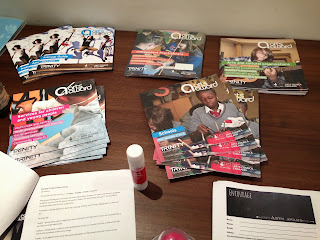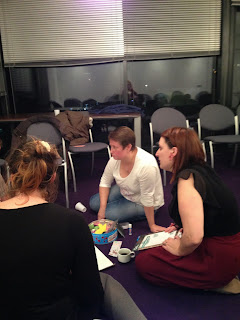On Wednesday 23rd October, we visited the Quarterhouse in Folkestone to deliver our third Arts Award Forum. This time we were looking at the Discover and Explore program and got a chance to discuss ideas and they way the program runs with Leanne Macdonald from Artswork, South East.
Please feel free to share and use our ideas in your Arts Award Delivery...
Discover:
The Discover program is designed for younger children and there are different workbooks for a different variation of age groups( KS1-KS3). Here are an example of some of the books :
There are three parts of the Discover program, these are:
A) Discover - What can you learn about/discover?
B) Explore- What artist can you research?
C) Share - How are you going to present it? (Can be one to one.)
OUR ACTIVITY
In groups we planned how to run an Discover programme both in an education setting and outside.
WITHIN SCHOOL
The 'school group' decided they would theme their work around nature, forest schools and their local environments.
Discover:
- Out door workshops to gather natural materials and using them to create art.
- Kites - history and DT/design elements
- Use of local areas such as a church - grave stones, stained glass windows etc.
- Nature artists
- Historical aspects of local area
- Religious artists
- Use of church, assemblies, presentations, arts evenings and open afternoons where children can take parents round and share what they are doing.
Extra Curricular
The 'outside of school group' decided to look at Gulbenkian Youth Theatre and the Youth Service. Here were some of the points they discussed:
- We decided the Youth Theatre are already discovering the Arts by participating in weekliy session. They look at a number of different art forms e.g. mask making, poetry, technical theatre. Incorporating all skills.
- The group decided that the Youth Service could run taster and drop in sessions so that young people could discover the Arts and make their own choice of what they would like to focus on.
- The use of Pintrest was discussed as an effective method of keeping different ideas on.
- The group felt that there needed to be greater awareness of Arts Award within the host organisations so thatcould be effectively run with assistance from non trained staff.
Explore:
- The group thought a buddy systems with Arts venues for tickets to shows and day trips to visit places would improve the cultiral offering
- Youth Service to encourage more visits to different arts venues identified by the young people.
- Pinterest - easily and quickly share ideas with people
- Gulbenkian Youth Theatre can share with their group in session tme
- Awards ceremonies, press coverage ... BUFFET!
WE WOULD LOVE TO HEAR YOUR ARTS AWARD DISCOVER AND EXPLORE STORIES...






















